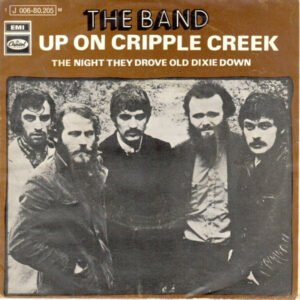June 30, 2023 —– Chart #202
Hello Music Friends,
Hey folks, welcome to another edition of Chart of the Week. Still hard to believe that I have done over 200 of these so far! The great news is there are plenty of songs left to do, and I have a full head of steam! Today we are going to 1969 and one of the great bands of that era, The Band. What a name. “Up on Cripple Creek” is the fifth song on the Band’s eponymous second album, The Band. It was released as a single in November 1969 and reached No. 25 on the Billboard Hot 100. “Up on Cripple Creek” was written by Band guitarist Robbie Robertson, with drummer Levon Helm singing lead vocal.
A 1976 live performance of “Up on Cripple Creek” appears in the Band’s concert film The Last Waltz, as well as on the accompanying soundtrack album. In addition, live performances of the song appear on Before the Flood, which records the Band’s 1974 tour with Bob Dylan, as well as on the 2001 expanded edition of Rock of Ages, originally released in 1972. The Band performed the song on The Ed Sullivan Show in November 1969.
“Up on Cripple Creek” is notable as it is one of the first instances of a Hohner clavinet being played with a wah-wah pedal. The riff can be heard after each chorus of the song. The clavinet, especially in tandem with a wah-wah pedal, was a sound that became famous in the early to mid-1970s, especially in funk music.
Live performance in 1978:
Drawing upon the Band’s musical roots—the American South, American rock and roll, and bluegrass/country—the song is sung from the point of view of a truck driver who goes to Lake Charles, Louisiana, to stay with a local girl, Bessie, with whom he has a history. In the song, he gambles, drinks, listens to music, and spends time with “little Bessie,” who takes an active role in the goings-on, while expressing her opinions, further endearing herself to the narrator. At the end of the song, after exhausting himself on the road, he talks about going home to his woman, “big mama,” but is tempted to return to Bessie again. Or he may not be cheating. Truckers also use the term “Big Mama” to refer to their dispatcher over CB radio. Concerns about the weather in other parts of the country and the line “this life of living on the road” suggest over-the-road trucking. At the start of the song he’s hauling logs off a mountain and at the end he may be weighing options: “rolling in” to home base for a new cargo or seeing his Bessie again.
One verse has the singer and Bessie listening to and commenting on the music 1940s and 1950s bandleader Spike Jones. Robertson said of Jones, “I was a Spike Jones admirer. I thought the way that he treated music was a healthy thing. He could take a song and do his own impression of it that was so odd and outside the box – and in many cases hilarious. I liked him a lot.”
So I have probably played this song with my band mates 500 times and it is just as fun to play today as it was the first time. I hope you enjoy it that much.
Keep Rockin’,
Stan Bradshaw
